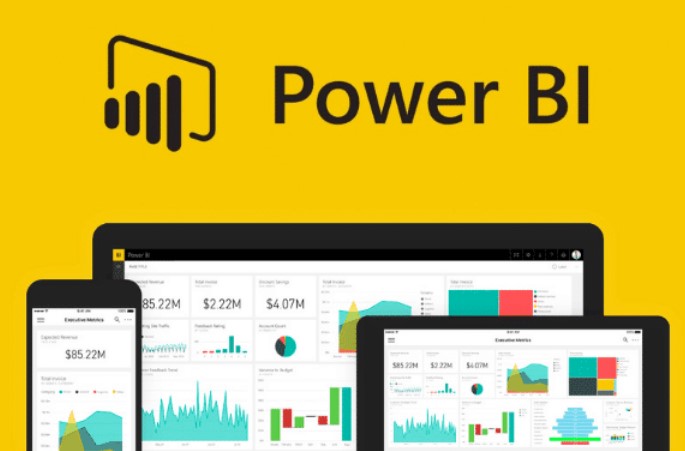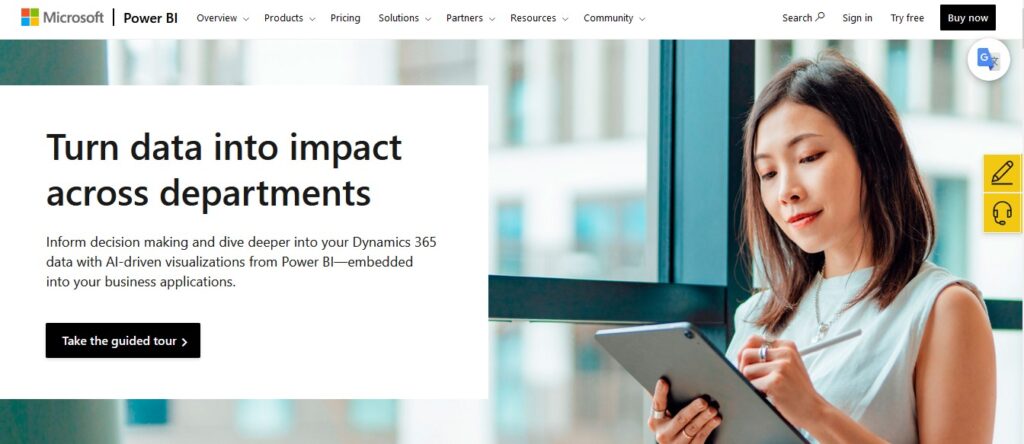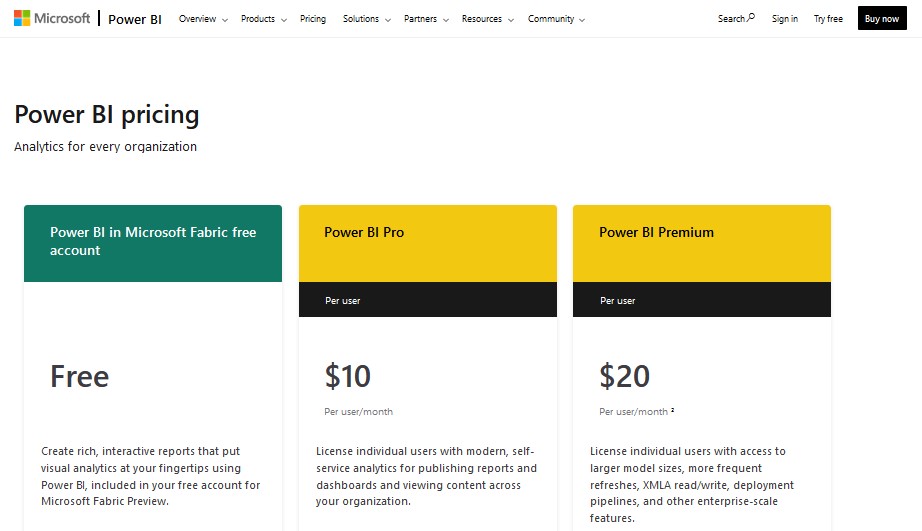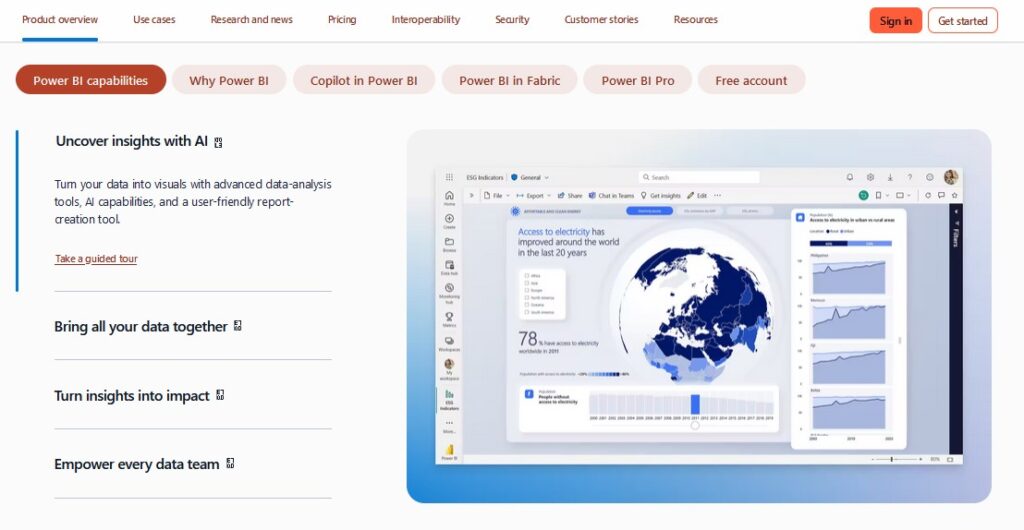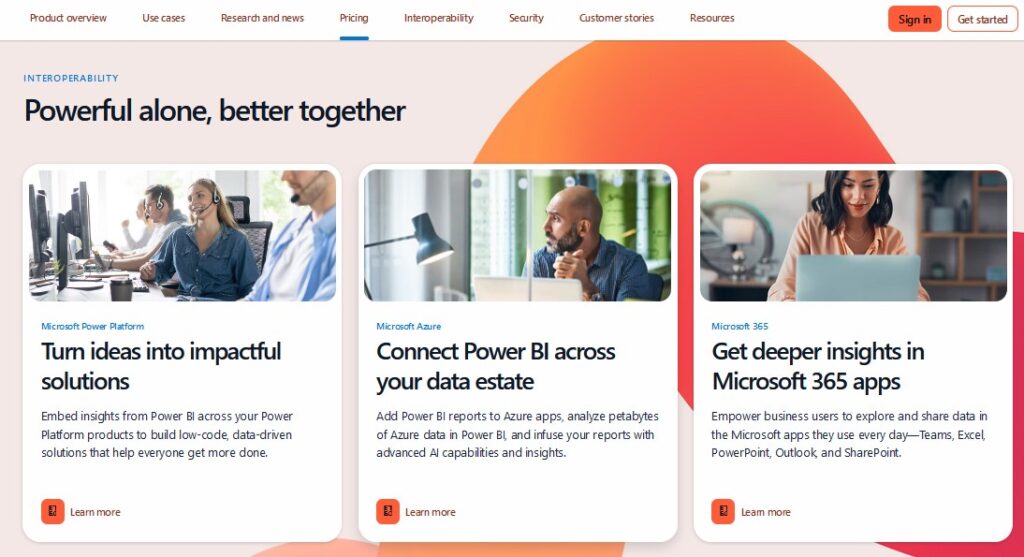Microsoft Power BI is a powerful business intelligence tool that offers a variety of pricing options to fit the needs of businesses of all sizes. The pricing structure includes a free version with limited features, as well as paid plans such as Pro and Premium, which provide more advanced functionalities. This flexibility makes Power BI an attractive option for companies looking to leverage their data without breaking the bank. In addition to its pricing options, Power BI boasts a wide range of features that cater to various business needs. These include data visualization capabilities, robust analytics tools, and seamless integration with other Microsoft products like Excel and Azure.
When it comes to reviews, Microsoft Power BI has garnered praise for its user-friendly interface and powerful reporting tools. Many users appreciate its ability to easily connect to multiple data sources and create insightful visualizations without requiring extensive technical knowledge. However, some reviewers have noted limitations in terms of complex calculations and customization options compared to other leading BI tools on the market. As for alternatives, businesses seeking CRM-focused solutions may want to explore Salesforce’s Tableau or Qlik Sense. Both platforms offer strong CRM integrations and advanced analytics capabilities tailored specifically for customer relationship management.
In conclusion, Microsoft Power BI’s pricing flexibility coupled with its rich feature set make it an attractive option for businesses looking to harness their data effectively. While it may not be the most customizable solution on the market, its user-friendly interface and seamless integration with other Microsoft products make it a compelling choice for many organizations.
Overview of Microsoft Power BI
Microsoft Power BI is a powerful business analytics tool that allows users to visualize and share insights from their data. It offers a wide range of features, including data connectivity, data preparation, and interactive dashboards. With Power BI, users can easily connect to various data sources, clean and transform their data, and create visually compelling reports and dashboards.
One of the key strengths of Power BI is its integration with other Microsoft products such as Excel and Azure. This makes it easy for users to leverage existing data assets and seamlessly integrate them into their Power BI solutions. Additionally, Power BI offers robust security features, making it suitable for enterprise-level use while also providing user-friendly interfaces for non-technical users to explore and analyze data. Overall, Microsoft Power BI is a comprehensive solution for businesses looking to gain valuable insights from their data in a user-friendly and efficient manner.
Microsoft Power BI is a powerful business analytics tool that allows users to visualize and share insights from their company’s data. With its user-friendly interface, Power BI provides a comprehensive overview of the organization’s performance metrics, trends, and key indicators in a single dashboard. This helps businesses make informed decisions based on real-time data and empowers employees at all levels to access and analyze critical information.
One of the key features of Microsoft Power BI is its seamless integration with various CRM systems such as Salesforce, Dynamics 365, and others. This allows companies to combine customer relationship management data with other operational data sources for a holistic view of their customers’ interactions and behaviors. By leveraging this integration, businesses can gain valuable insights into customer preferences, buying patterns, and sales pipeline performance. Additionally, Power BI offers pre-built dashboards and reports specifically tailored for CRM data analysis, making it easier for organizations to derive actionable insights without extensive customization.
In conclusion, Microsoft Power BI is a game-changer for businesses looking to harness the power of their data. Its ability to integrate seamlessly with CRM systems enables organizations to gain deeper insights into customer behavior and drive more targeted marketing strategies. With its intuitive interface and powerful analytical capabilities, Power BI empowers users across the organization to make smarter decisions that drive business growth.
Microsoft Power BI Pricing: Different pricing plans and options
Microsoft Power BI offers several pricing plans and options to suit the needs of different users. The most basic plan is Power BI Desktop, which is a free version that allows users to create reports and visualizations. For more advanced features and capabilities, users can opt for the Power BI Pro plan, which includes collaboration tools, sharing capabilities, and more storage space.
Additionally, there is also the Power BI Premium plan, which is designed for larger organizations with higher data capacity needs. This plan offers dedicated cloud resources, enhanced performance, and increased flexibility in managing large datasets. Overall, Microsoft Power BI provides a range of pricing options to cater to individual users as well as larger enterprises, making it a versatile choice for data analytics and visualization needs.
Microsoft Power BI offers a variety of pricing plans and options to meet the needs of different users. For individuals and small teams, the Power BI Desktop is available for free, providing access to a full suite of data visualization and reporting tools. This allows users to create interactive reports and dashboards without any additional cost. For larger organizations or those looking for enhanced features, there are two main pricing plans: Power BI Pro and Power BI Premium. The Pro plan offers advanced collaboration features, larger data capacity, and better security controls at a per-user monthly subscription fee.
For businesses with more extensive requirements in terms of data storage and processing power, the Power BI Premium plan provides dedicated cloud resources for an organization at a flat monthly rate. This allows for greater scalability and flexibility in managing large volumes of data with more sophisticated analysis capabilities. Additionally, Microsoft also offers special pricing options for educational institutions through their Power BI Education program which enables students to gain valuable experience in using advanced CRM tools.
In conclusion, Microsoft’s range of Power BI pricing plans caters to the diverse needs of individual users as well as organizations by offering options based on user numbers, collaboration requirements, and comprehensive business intelligence capabilities. Whether it be free access for individual use or premium offerings tailored to enterprise-level demands, Microsoft ensures that its customers have the flexibility to choose a plan that best fits their specific needs without compromising on quality or functionality within CRM integration.
Microsoft Power BI Features: Key features and capabilities of Power BI
Microsoft Power BI is a powerful business intelligence tool that offers a wide range of features and capabilities to help businesses analyze, visualize, and share data. One of the key features of Power BI is its ability to connect to a wide variety of data sources, including CRM systems such as Salesforce, Dynamics 365, and others. This allows organizations to seamlessly integrate their customer data into Power BI for comprehensive analysis and reporting.
Another standout feature of Power BI is its intuitive and user-friendly interface, which makes it easy for users to create interactive dashboards, reports, and visualizations without needing extensive technical expertise. Additionally, the tool offers robust data modeling capabilities that enable users to transform raw data into meaningful insights through relationships between various datasets.
Furthermore, Power BI provides advanced analytics features such as predictive analytics and AI-powered insights through integration with Azure Machine Learning. This allows businesses to leverage machine learning algorithms to uncover patterns in their CRM data and make informed decisions based on predictive forecasts. In conclusion, the multitude of features offered by Microsoft Power BI makes it an indispensable tool for businesses looking to harness the full potential of their CRM data for actionable insights and strategic decision-making.
Microsoft Power BI Reviews: User and expert reviews of Power BI
Microsoft Power BI is a versatile and powerful business intelligence tool that has received high praise from both users and experts. A common theme in user reviews is the ease of use and the intuitive interface, making it accessible for both technical and non-technical users. Many users also appreciate the seamless integration with other Microsoft products such as Excel, SharePoint, and Dynamics CRM, which streamlines data analysis processes. In addition to its user-friendly nature, experts have lauded Power BI for its robust set of features, including advanced visualizations, data modeling capabilities, and real-time analytics.
One aspect frequently mentioned in reviews is Power BI’s ability to connect to a wide range of data sources, allowing users to analyze their data more comprehensively. The platform’s flexibility in creating customizable dashboards and reports has also garnered positive feedback from users across various industries. Furthermore, many reviews highlight the platform’s responsiveness to user feedback by regularly introducing updates and new features based on customer suggestions. Overall, the consensus among both users and experts is that Microsoft Power BI offers a comprehensive solution for businesses seeking efficient CRM analytics tools while maintaining a competitive edge in their respective industries.
In conclusion, the overwhelmingly positive reception of Microsoft Power BI reflects its effectiveness as a business intelligence tool tailored for CRM applications. The combination of user-friendly design, extensive feature set, seamless integration with other Microsoft products like Dynamics CRM makes it an attractive choice for organizations looking to enhance their analytics capabilities.
Microsoft Power BI Alternatives: Competing tools and their comparison
When it comes to data visualization and business intelligence, Microsoft Power BI has long been a dominant force. However, in recent years, several competing tools have emerged as strong alternatives for businesses looking for a comprehensive CRM (Customer Relationship Management) solution. One such alternative is Tableau, known for its intuitive user interface and powerful analytics capabilities. With its drag-and-drop functionality and seamless integration with various data sources, Tableau offers a compelling option for companies seeking to gain deeper insights into their customer data.
Another worthy competitor is QlikView, which stands out for its robust data exploration and visualization features. QlikView’s associative model allows users to make connections between different sets of data on the fly, providing a unique approach to understanding customer behavior and preferences. Additionally, the tool’s flexibility in handling large volumes of complex data sets makes it an attractive choice for enterprise-level CRM solutions. Furthermore, Salesforce Einstein Analytics presents another viable alternative with its focus on AI-driven insights and predictive analytics. By leveraging machine learning algorithms and natural language processing capabilities, Salesforce Einstein Analytics empowers organizations to uncover valuable patterns within their customer data while also streamlining decision-making processes.
In conclusion, while Microsoft Power BI remains a popular choice for CRM-related business intelligence needs, there are several compelling alternatives that offer unique features and advantages. From Tableau’s user-friendly interface to QlikView’s powerful associative model and Salesforce Einstein Analytics’ AI-driven insights, businesses have options when it comes to selecting the right tool for their CRM requirements.
Conclusion
In conclusion, Microsoft Power BI is a powerful and versatile business intelligence tool that offers a wide range of features at competitive pricing. The platform’s intuitive interface, strong data visualization capabilities, and seamless integration with other Microsoft products make it an attractive choice for businesses looking to harness the power of their data. However, it’s important to carefully consider the specific needs and budget of your organization before committing to a Power BI plan.
Furthermore, as with any software solution, there are alternatives to Microsoft Power BI that may better suit certain business requirements. Tools like Tableau and QlikView offer different strengths and weaknesses compared to Power BI, so it’s crucial for decision-makers to conduct thorough research and evaluation before making a final choice. Ultimately, understanding the unique demands of your business and the specific use cases for business intelligence will be key in determining whether Microsoft Power BI is the right fit or if another option would better serve your organization’s needs.
